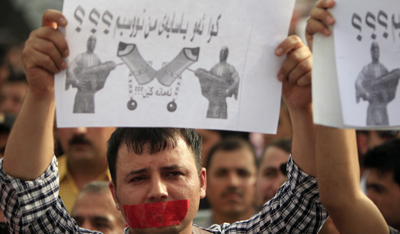Kurdistan is different, as nearly every Iraqi Kurd I have ever met has said. Far less violent than the rest of Iraq since the U.S.-led invasion in 2003, the parts of the north controlled by the Kurdish Regional Government have escaped the kind of sectarian unrest that continues to flare in the south. But in recent months more than 150 Iraqi Kurdish journalists have been injured or attacked, according to the local Metro Center to Defend Journalists. One journalist was murdered three years ago in Kirkuk after uncovering evidence of government corruption. But most of the journalists who find themselves more recently under siege have been covering violent clashes between the Kurdish security forces and protestors in Sulaymaniyah.
This rise in attacks against the press was the backdrop for the conference, aptly named “Safety for Press is Safety for All” and held Thursday in the Kurdish capital of Arbil. Sponsored by the non-governmental Independent Media Centre for Kurdistan, the conference brought together dozens of journalists, along with Iraqi Kurdish government officials such as the minister of culture and a number of mid-level police and security force commanders. I was asked to give a global perspective on how the situation for the press here compares with other parts of the world before we began discussing the issues along with possible solutions.
One thing that united everyone in the room and that unites almost everyone in Iraqi Kurdistan is the Kurdish-speaking population’s long struggle for autonomy. The pesh merga or “those who die together” armed militias continue to dominate Kurdistan today after having fought for decades as guerrilla groups against various Iraqi governments based in Baghdad. Among the movement’s most revered events is the “intifada” or attempted “shaking off” of Saddam Hussein’s regime in 1991 after the Gulf War. Thousands were killed and far more became refugees after the attempted overthrow failed.
Just blocks from the conference site is a statute of Gad Gross, a young German-Romanian photojournalist working for Newsweek who was killed in Kirkuk during the uprisings. I was one of the journalists who had been traveling with Gad when he was killed, I told the group of Kurdish journalists and officials. We were embedded with Iraqi pesh merga. French photojournalist, Alain Buu and I were later captured and ended up spending 18 days in captivity, most of it in what I believe was Abu Ghraib.
Your struggle, I told the group, is something I’ve witnesses firsthand. It’s what unites you and it’s part of your fabric as a people. But recently, Kurdish police and security forces have been clashing with Kurdish people protesting grievances over public services, health care, and alleged corruption in the region’s two main political parties, each of which has its own force of pesh merga. The same security forces have also been attacking journalists who have been covering the protests.
The audience discussion was off the record. But it is no secret that police here fail to distinguish between protesters and reporters, as security forces have unleashed batons and water cannons against all. Some journalists have been seen throwing rocks at police, too, observers on both sides of the issue told me. Police and other security personnel complain that journalists have widely reported on the civilians as well as journalists who have been injured, but not about the many police and security officers who have been injured as well.
Earlier today, in Sulaymaniyah, I witnessed a ceremony at Livin magazine where journalists and others–including a recently imprisoned and tortured Kurdish intellectual, still sporting one black eye–were honored with awards given in the name of a Kurdish investigative journalist. Soran Mama Hama was murdered by unidentified gunmen in July 2008 in Kirkuk.
He had previously received death threats, and filed complaints about them to the Kurdistan Journalists Syndicate. His murder came after he wrote a story in Livin alleging that police and security forces were complicit in a prostitution ring in Kirkuk. At a packed ceremony today inside Livin‘s small offices, one speaker focused his remarks on the pesh merga. You are a force of the people, he said. So now why are you attacking your own people?
Gad Gross was killed just north of Kirkuk after he and Kurdish pesh merga Bakhtiar Abdl al-Rahman were found hiding in a small concrete building where together they took cover during the previous day’s battle. They were executed back-to-back 20 years ago, on the morning of March 29. Back in 1991 that day, as today, happened to be Good Friday.
(Reporting from Arbil and Sulaymaniyah, Iraqi Kurdistan)
